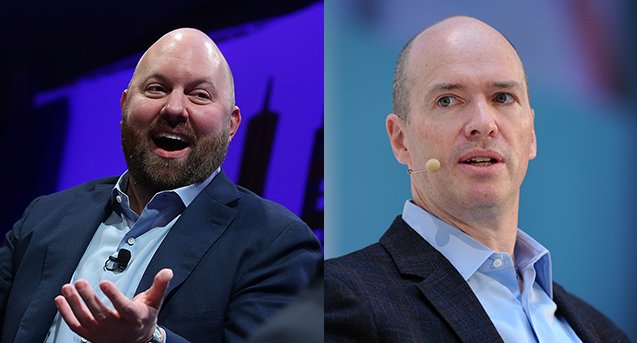When Marc Andreessen and Ben Horowitz founded their eponymous firm a decade ago, they probably didn’t realize how, through a series of preternaturally smart investments, they were going to define the venture capital industry and Silicon Valley itself. Andreessen Horowitz boasts a portfolio that’s included more than 240 companies with household names such as Airbnb, BuzzFeed, Facebook, Instagram, Lyft, Pinterest and Skype.
They weren’t exactly coming onto the scene from out of nowhere. Andreessen led the team that created Mosaic in the 1990s, one of the first internet browsers, before cofounding Netscape, where he hired Horowitz as a project manager. Together, Andreessen and Horowitz went on to cofound software company Opsware, which they sold to Hewlett-Packard for $1.6 billion in 2007. Over the years, Andreessen became well known for his prolific blogging and use of Twitter, with many in the tech industry treating his commentary with the sort of reverence reserved for oracular utterances.

But the story of Andreessen Horowitz is about more than smart tech investments. The history of the firm tracks the broader history of Silicon Valley, from the rise of cloud computing and ride sharing to controversies over the lack of women in leadership and rising income inequality in the Bay Area. Here are the key moments that have defined the first decade of Andreessen Horowitz and its climb through the venture capital ranks.
July 6, 2009 / The Launch

Andreessen Horowitz launches with $300 million in its initial fund. In their announcement, the partners tout that they have started three companies and been angel investors in 45 startups in the previous five years. They’re sending a signal that both know what it’s like to be an entrepreneur trying to make it in the highly competitive world of Silicon Valley, and they know how to make decisions about which fellow entrepreneurs to back.
Andreessen Horowitz joins the fray right when VC seems to be on a downward trend: VC firms invested $3 billion in the first quarter of 2009, the lowest investment amount since 1997, according to data from the National Venture Capital Association and PwC.

July 2010 / Entering the Cloud
Andreessen Horowitz announces its first investment in a cloud company, leading the $10 million Series A funding round for identity management firm Okta.
Okta cofounders Todd McKinnon and Frederic Kerrest were “seeking funding from established investors,” Kerrest says in a statement, but the young firm’s team won them over. “In reality, we were looking for long-term partners who had experience building large, enterprise software companies, and that’s what we found in Andreessen Horowitz,” Kerrest says.
Okta won’t be the only company citing entrepreneurial experience and focus as a deciding factor in seeking the firm’s backing. The VC pair make those assets a focal point, saying they are modeling their firm on the legendary Creative Artists Agency in Hollywood. The talent agency offered the founders an “enormous amount of guidance and career advice that was incredibly direct,” CAA cofounder Michael Ovitz says on a podcast with Horowitz.
By the end of 2010, Andreessen Horowitz raises a new fund of $650 million, bringing its total raised to nearly $1 billion in its first two years. The 2010 fund is among the largest that year, placing the new firm among investment teams that have been around since the 1970s and ’80s, including Sequoia Capital, Oak Investment Partners and Battery Ventures. Andreessen Horowitz now has plenty of cash with which to prove whether its “talent agency” approach to VC will pay off.
July 2011 / A Growing Appetite
The firm invests $60 million of a $112 million fundraising round for home-sharing site Airbnb, which is already in some 186 countries and more than 16,000 cities.
Airbnb embodies the idea of “software eating a traditional business,” a trend Andreessen expounds on a month later in his now-famous manifesto. In his “Why Software is Eating the World” article, he writes that software firms will become “highly valuable cornerstone companies in the global economy, eating markets far larger than the technology industry has historically been able to pursue.”
July 2012 / Bigger Bets
The focus on software continues to guide Andreessen Horowitz. In its largest investment to that point, it invests $100 million in GitHub, a site for software developers.
May 2013 / The Gig Economy
The rise of software and increasing prevalence of smartphones sparks a wide range of new consumer-focused apps. Andreessen Horowitz says it will lead the Series C funding round of $60 million in ride-hailing app company Lyft.
Nov. 18, 2015 / Branching into Bio
Andreessen Horowitz moves into specialized funds with a new $200 million bio fund. The expansion comes as the intersection of healthcare and technology is grabbing the attention of a growing number of VC firms. The hype around blood-testing company Theranos has been rising for several years by this point, though it is starting its descent following the publication of an article in October in the Wall Street Journal challenging the company’s claims about what its technology is really capable of doing. Andreessen Horowitz eschews any investments in Theranos, investing instead in companies like digital medical records site Ciitizen, chronic illness treatment company Omada Health and PatientPing, which notifies care teams about their patients’ interactions with the healthcare system.
April 2017 / IPO Vindication
Okta goes public in April 2017, finishing its first day of trading up 38 percent from its debut price. Andreessen Horowitz had already raised another $1.5 billion in 2016, and in December 2017, the firm would announce its second bio fund, with $450 million ready for investment. In 2019, Andreessen would share on the Zero to IPO podcast that he and Horowitz were laughed at for investing in Okta in 2010.
June 2018 / A Long-Awaited Addition

The development of funds specific to emerging areas continues, with Andreessen Horowitz establishing a crypto fund of $350 million. Katie Haun, a former federal prosecutor focused on fraud, cybercrime and corporate crime, is brought on to help lead. She’s the firm’s first female general partner. The addition comes at a time of reckoning in Silicon Valley—from the ranks of engineers to the leadership of VC firms—about the barriers, discrimination and harassment faced by women in tech.
June 2018 / Software Pays Off
Microsoft says it is buying GitHub for $7.5 billion, and Andreessen Horowitz reportedly makes $1 billion from the sale. Peter Levine, a general partner at Andreessen Horowitz, calls the acquisition the “next chapter in the future of software” since it combines GitHub’s software code base—the largest in the world—with Microsoft’s cloud. It’s a realization of success in two key areas where the firm repeatedly placed bets.
August 22, 2018 / Diversifying
The conversation in Silicon Valley about the gender gap leads to greater scrutiny of racial disparities. Horowitz and firm partner Chris Lyons write that since culture is “central to successfully building, marketing and selling new technologies,” they feel they are “leaving opportunity on the table.” They aim to fix this with a new fund, reportedly around $15 million, focused on connecting “cultural leaders” with tech companies and enabling more young African Americans to enter the tech industry.
March-April 2019 / The IPO Wave
It’s a big start to the year for Andreessen Horowitz, with a wave of initial public offerings by portfolio companies. Lyft goes public March 29, followed by PagerDuty and Pinterest in April.
Lyft, which Andreessen Horowitz has a 6 percent stake in before the public offering, raises some $2.3 billion in its IPO. The firm has 18 percent of PagerDuty, which raises more than $200 million in its first day of trading, and it has nearly 10 percent of Pinterest, which raises more than $1.4 billion by going public. Attention turns to how the onslaught of IPOs will pump even more money into the Bay Area, where there’s already a skyrocketing cost of living.
For PagerDuty, a company that makes technology for incident-response, having Andreessen Horowitz’s backing since 2013 proves to be a testament to the firm’s successful talent agency model and the recognition it has gained. “They helped a lot in terms of executive recruiting, both with their brand name—executives want to work at an Andreessen-backed company—and with hands-on expertise,” PagerDuty cofounder Alex Solomon says in a statement.
2019 and Beyond / Adapting for New Territory
To handle its increasingly diverse portfolio spanning areas such as cryptocurrencies, real estate and more, the firm says it is registering as a financial advisor. Though Forbes, which was first to report the news, framed it as “renouncing” its VC firm status, Andreessen Horowitz managing partner Jeff Jordan tweets that the move “doesn’t mean our jobs change. We are and will remain a VC firm. Our mission always has been—and always will be—to back the best tech entrepreneurs, at all stages.”






